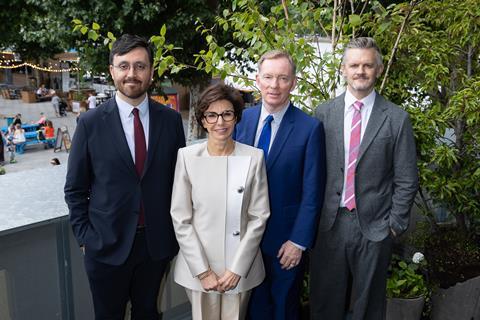
The British Film Institute (BFI) and France’s CNC have today officially forged a pioneering partnership to work together to boost the independent film industries and support the screen culture in each of their countries.
The Moving Image Cooperation Agreement was signed by BFI chief executive Ben Roberts and CNC president Gaëtan Bruelin at the BFI Southbank today in the presence of French culture minister Rachida Dati, and Chris Bryant. UK minister for Creative industries, arts and tourism.
The delegation was in London as part of French president Emmanuel Macron’s state visit to the UK, the first by a European head of state since the UK’s withdrawal from the European Union.
The agreement is the first of its kind the BFI has with a European country. (It has one other with Uruguay).
The agency-to-agency framework aims to enable the BFI and the CNC to “establish a policy of strategic co-operation to enhance cultural diversity, widen audiences and strengthen their respective industries”.
“The UK and France are two of Europe’s most dynamic filmmaking nations,” said Roberts. ”We have a long history of collaboration, including through co-production and the distribution and exhibition of each other’s films across all platforms. We share mutual values and a commitment to cultural diversity,including an appreciation for creativity and storytelling and our filmmakers have always been inspirational and influential to each other.”
According to the BFI, the areas on which the agreement will focus are:
- Public policies around support measures in the film, audiovisual and moving image sector including topics such as independent, local production and the distribution, promotion and exhibition of diverse works to audiences in both countries, artificial intelligence, environmental sustainability, intellectual property and equity, diversity and inclusion (EDI);
- Education, with a focus on providing moving image culture to young audiences
- Heritage, including restoration, preservation and collaboration on specific projects
- Events to facilitate greater business and professional relationships between UK and French companies with a focus on, but not limited to, co-production
- Mutual knowledge sharing between BFI and CNC through an employee exchange programme;
- Audience development and support measures for cinemas, festivals and national online platforms with a focus on encouraging UK audiences for French films and vice versa.
A series of warm speeches repeatedly emphasised the close relationship that exists between the UK and France.
“France and the United Kingdom are two great film nations, with strong institutions that have a global vision of cinema and a desire to support independent creativity,” said Dati. “Today, this issue is directly linked to cultural sovereignty. I am convinced that we can work with the United Kingdom to develop fruitful exchanges in support of independent creativity.”
Roberts and the CNC’s Bruel said shared intiatives would help bring together UK and French producers.
”Co-production is one of the most meaningful ways we can continue this shared exchange - and this initiative of knowledge building and collaboration has been built in that spirit,” said Roberts. ”In the UK we have createdthe conditions to foster this through the UK Global Screen Fund and carefully designed Audio-Visual Expenditure Credits including the new Independent Film Tax Credit of 40%.”
Bruel hinted at further moves to incentivise the countries’ producers to work together further.
“This agreement is good news for our industries and professionals,” he said. ”We have already organised several co-production meetings to strengthen links and co-production between France and the UK. But we still want to do more, and we can do more, by exchanging ideas between real partners on the common challenges facing our industry: the return of audiences to cinemas and our European independence in front of the giants of global competition.”
Bryant added: “We may be very different in many ways but the UK and France certainly know how to make great films that inspire, amuse and challenge us. Our exchange is always amicable but we want to take it to another level, screen by screen, camera by camera, cinema by cinema.”
BFC and Film France
As part of the new agreement, the British Film Commission (BFC) and Film France CNC signed a memorandum of understanding (MoU) to boost collaboration between each country’s screen industries and further incentivise inward investment.
With the MoU, both film commissions are aiming to boost greater economic, cultural and creative exchange between both countries.
Recent projects that filmed or carried out VFX and post production work in both territories include The Amateur, Head Of State, Damsel and season two of The Lord Of The Rings: The Rings Of Power.
In the UK, inward investment spend on film and high-end television production during 2024 reached £4.7bn.
“Our aim with this MoU is to work more closely with the CNC [of which Film France is part] to support a frictionless service for cross-territory productions, allowing both nations to harness the economic and creative potential of inward investment film and high-end TV production,” said Wootton.
Bruel added: “This agreement marks a new chapter in the long-standing creative partnership between France and the United Kingdom. Through this MoU, we are not only reaffirming our shared commitment to supporting world-class film and television production, but also strengthening a dynamic ecosystem for cultural and economic exchange. In today’s truly global market, the CNC strongly believes in welcoming film and TV productions on a European scale.
“Together, our two countries offer an exceptional combination of assets: a rich diversity of natural locations—each with its own distinctive identity—skilled professionals, robust infrastructure, and world-leading VFX and post-production ecosystems. By deepening our collaboration, we are creating new opportunities for producers and building a more connected, competitive environment for cross-border production. This is both a cultural and economic opportunity, and we are proud to move forward with our British partners”.
The agreement follows previous MoUs signed between the BFC and European counterparts, including Spain, Italy, Austria, Norway, Malta and the Netherlands.

























No comments yet